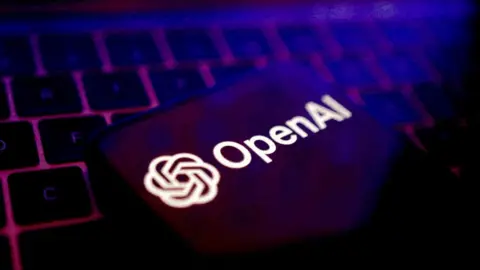OpenAI completes shift to becoming for-profit entity

Lily JamaliNorth America Technology Correspondent, San Francisco
 Reuters
ReutersOpenAI has completed its long-planned conversion to a for-profit entity, a move that could allow it to raise billions of dollars in investment and potentially clear the way for a stock market debut.
As part of the arrangement, OpenAI and Microsoft announced changes to their longstanding partnership that leave the tech giant with a 27% stake in the ChatGPT-maker.
The deal changes the nature of the relationship between the two companies, which first partnered in 2019, when OpenAI was a non-profit artificial intelligence (AI) research organization.
Under the terms, Microsoft can now independently pursue artificial general intelligence – sometimes defined as AI that surpasses human intelligence – on its own or in partnership with other parties, the companies said.
OpenAI also said it was convening an expert panel that will verify any declaration by the company that it has achieved artificial general intelligence.
The company did not share who would serve on the panel when approached by the BBC.
Microsoft will also support OpenAI’s board with the conversion to a for-profit entity, which the company has confirmed boss Sam Altman will not hold an equity stake in, as first reported by Bloomberg.
The original partnership between the companies gave Microsoft rights to much of what OpenAI produced at a time when the startup was hungry for cloud computing resources.
OpenAI has since gone on a deal spree with a host of other major tech players leading to speculation that an AI bubble may be in the offing.
The revised deal extends Microsoft’s rights to OpenAI’s AI models through to 2032 but excludes consumer hardware.
OpenAI’s trajectory
OpenAI brought AI to the mainstream user in 2022 with the introduction of ChatGPT.
At the company’s DevDay event in San Francisco earlier this month, Mr Altman said the company had reached 800mn weekly active users.
OpenAI – now valued at $500bn – has released a slew of new products aimed at increasing engagement with its AI tools.
These include the AI-powered browser ChatGPT Atlas, which competes with Google Chrome, and a video generation tool called Sora.
But the company also routinely finds itself at the centre of controversy.
Last week, OpenAI blocked Sora 2 from creating deepfake videos portraying Dr Martin Luther King Jr after intervention from the late civil rights leader’s family.
OpenAI also recently said ChatGPT would soon start allowing erotica for verified adults.
Meanwhile, critics say OpenAI has downplayed the potential mental health implications of its AI tools which they charge are being built with few guardrails in the pursuit of profits.



